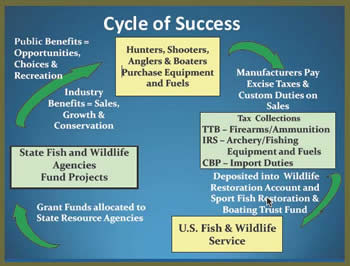Conservation Practices for Anglers
Sport Fish Restoration Fund
It's hard to imagine that a tax originally levied to aid in financing World War II would eventually help ensure an angler's chance of catching a stringer of game fish anywhere in the United States. In fact, nothing in the past 100 years has had a bigger impact on recreational fishing than this war tax on fishing tackle, which, in 1950, became the first-ever dedicated federal source of money to be used by state natural resources agencies to improve the fishing experience. The result is one of the largest and most successful conservation programs in the world.

The Federal Aid in Sport Fish Restoration (SFR) Program has had a major impact on sport fishing nationwide. Since its enactment in 1950, state fish and wildlife agencies have received more than $3.2 billion under this program. The tax monies collected go to state fish and wildlife agencies for fisheries research, habitat improvement, aquatic education, and fishing and boating access facilities (such as docks and ramps).
It's all made possible by sportsmen and women who, by doing the things they love - fishing and boating - help to restore and protect fish and their habitats in each state in this country. The purchase of fishing equipment and motorboat fuels by fishing and boating enthusiasts supports sport fish restoration, preservation and conservation. By taxing anglers, they are given a stake in ensuring the money is used wisely. This forms the basis of the user pay/user benefit "cycle of success."
- Learn more about how Illinois benefits from the Sport Fish Restoration Program here.
- Learn about the Sport Fish Restoration Program and the items that are to provide the funds for Sport Fish Restoration.
Fishing Licenses
When you purchase a fishing license, you're helping to protect, preserve and enhance the sport of fishing for today and for generations to come. License fees help pay for fishery and hatchery management, habitat development and protection, endangered species programs, fishing and conservation education, lake maps and other publications, and many other valuable programs.
- Be sure you have a valid and current Illinois state fishing license.
Litter and Waste
No one likes to see garbage in the water. But Bbeyond how bad it looks, floating in our natural resource and washing up on the banks, it also causes problems for wildlife as they often mistake it for food or become entangled in it. In addition, plastic bags can clog a boat's cool-water intake valves, causing the engine to overheat and leading to expensive repairs. Monofilament fishing line can get wrapped around a propelers, get tangled in the wings of waterfowl, or impact turtles and other aquatic wildlife.
Under U.S. law, it is illegal to put any garbage into the water from a vessel on a lake, river, stream, or any coastal waters up to 3 miles offshore. Sinking empty soda cans or bottles is considered littering and is therefore illegal.
- It is important that anglers and boaters pitch-in to keep our lakes and streams free of debris. Please pack out everything you carry in, including food wrappers, old fishing line, bait holders, empty cans or bottles, and plastic bags. As an added conservation measure, pick-up litter left behind by others, too. It is easy to carry a small paper bag for this purpose. If you are fishing from a boat, be sure your litter is put into a closed container so it can't blow out.
If we all pitch-in, our lakes and streams will be much cleaner.
Boating
Boats can affect the aquatic environment in a number of ways. Propellers may destabilize the sediment in lake or river bottoms directly, or indirectly, through physical damage to emergent macrophytes (aquatic plants). Wakes can cause erosion along the shoreline and a affect sensitive areas. Anchoring along spawning habitat in late spring/early summer can affect reproductive activity of some sportfish, such as nesting bass. Anchors can also cause damage to the substrate. Water quality can be affected by fuel or oil leakage.
- Be mindful of how boating interacts with the environment and do your best to avoid causing sediment resuspension, water pollution, disturbance of fish and wildlife habitats, destruction of aquatic plants, and shoreline erosion.
- In addition, products to wash boats can often contain toxic ingredients, such as chlorine, phosphates, and ammonia. The alternative cleaning methods suggested below prevent the release of pollutants into the water.
Alternatives to toxic cleaners:
General floor and window: 1 cup vinegar in 2 gallons of water. Use baking soda to scrub if needed.
To clean aluminum on a boat: 2 teaspoons of cream of tartar in 1 quart hot water.
Boat Fuel
Boat engines are designed to deliver a large amount of power in a relatively small size. As a result, a certain amount of the fuel that enters into a motor is discharged unburned and ends up in the water. In addition, there is always a concern with spills or leaks associated with the transfer and storage of gasoline near water bodies. A single gallon of fuel can contaminate a million gallons of water.
- Be extra careful when transporting gas containers, as well as when filling boats at a marina. Cleaner technology, such as four-stroke engines and more efficient two-stroke models, should help to reduce the inputs of fuel and exhaust into water bodies over time.
Facilities
Everyone has a better fishing experience when it is a pleasant one. Be respectful when using boat ramps, marina facilities, fish cleaning stations, restrooms, and parking areas.
- Always be sure to either take your trash with you or dispose of it properly. Adhere to the adage: leave it better than you found it.
To continue your awareness on the important role that anglers and boaters play as stewards of our fisheries, please refer to the Code of Angling Ethics.



